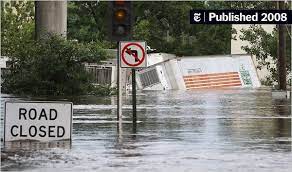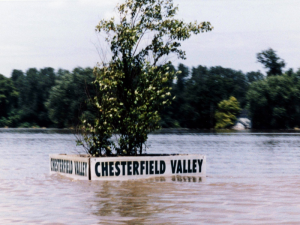
Although this story was originally written for the prompt Changing Times, it is a Floods story too.
The first of my Boston friends to visit me after I left to enroll in a Ph,D.program in the Midwest was Jack. We had become buddies through our participation in a Men’s Group that lasted about five years. By the time he arrived at my apartment in Champaign, Illinois, he was a bit rattled and needed to talk. He was shaken up by something that had happened while he was in Indiana a few days earlier. But the subject of his concern would turn out to be very different from the kinds of personal and emotional terrain that he and I used to explore along with Kevin, Steve, and Bill.
Jack hadn’t made a trip from the East Coast all the way to Illinois just to see me. (The first time someone finally did that several years later, I ended up asking her to marry me. And she said yes. But that’s a story for another day.) FEMA sent Jack to Indiana as part of the relief effort after the disaster that people around there now refer to as, “The Great Flood of 1993.” The major flooding had happened over a period of months and it was the final days of October when they sent Jack on his mission. 
A lot of people—especially those from the Northeast or the West Coast—may have totally forgotten about this, but those of us from the hinterlands recall that in the summer of 1993, the upper Mississippi River Basin experienced the costliest flood in the history of the USA. About 150 rivers and tributaries flooded. (Ok, I didn’t remember that stat. I had to look it up.) If people from other regions recall any part of this, it might be because it led to a great celebration of the character of the American heartland, as so many thousands of Midwesterners turned out to volunteer—to place sandbags prior to the floods and to aid their neighbors afterwards. Those who followed the news might also remember that the Mississippi reached its highest flood stage in U.S. history and among other consequences, smashed a 100-yard hole through a levee at West Quincy, Missouri; for the next 71 days, there was no bridge for 250 miles that crossed the Mississippi from eastern MO to southern IL.
Jack anticipated that coming to the Midwest would be a lot different kind of experience, potentially a more culturally unfamiliar experience for him than it had been for me. He knew that I had started out in Indianapolis, Indiana, and went all the way through public high school there before arriving in the Boston area for college. My parents and my sister Laurel still lived there. Going back to school after two decades of post-collegiate life in Boston had been a kind of homecoming for me; the University of Illinois at Urbana-Champaign was an easy two-hour drive from my childhood home, where Mom and Dad still lived..
In contrast, Indiana and its people were going to be a new experience for Jack. His most comfortable milieu was in the Irish parts of Boston where he grew up—or even in the Old Country, Ireland itself, where he and his brother, in a decisive act of entrepreneurship, took over an old rundown hotel somewhere in the Connemara region and got stuck running it for several years. That was back in the days when he was drinking, long before I knew him. In fact, he said it was only because he and his brother were both drunk at the time that they made the offer on the hotel. He had found out about the Men’s Group from someone he knew in AA. The drinking life was behind him, but he retained some good stories he didn’t mind sharing from back in the day.
Jack had been involved in building and various parts of the construction trades around Boston. He had a good eye for property and how to inspect damage and estimate the cost of repair. Those were the kinds of talents and skills that FEMA needed. The Great Flood of 1993 was the second or third disaster for which they had called him in as a specialist. He would meet with homeowners, examine their documentation, take photos and do a damage assessment, and file paperwork authorizing emergency funding as was appropriate according to the regulations.
He came by my apartment. I showed him around—here’s where I work at my desktop computer; here’s my small second-floor balcony just large enough to accommodate a small hibachi in the good weather; here’s my couch. (It wasn’t a very long tour.) I offered him a soft drink and some pretzels. I noticed that he still had the same lean body (for a guy around the same age as me) and the ruddy face that I remembered. He also still had the Boston accent, which I enjoyed after not hearing it for a while. We then we went out to Espresso Royale, one of the coffee shops beginning to proliferate across the country. I only knew that there were more of those than I would have expected in Champaign; it would take a couple more years to realize that they were popping up in every town.
We would eventually catch up on all kinds of matters: what it was like for me to be back in school in my forties, how was life in Champaign and Urbana similar to or different from Boston? Was it hard to meet women here? What were they like? How was the bike riding? What were the rents? But first he had to unload. He had to tell me a story.
To understand his exasperation, it’s important to realize that he was putting in at least twelve hours a day including weekends. When he went to one of these disaster zones, he didn’t even make a pretense of trying to maintain “work/life balance.” He wanted to help people as much as he could, as rapidly as he could and to the full extent his authority permitted. He just worked. Drank coffee and worked.
He had inspected a neighborhood a few days ago that had several damaged homes in a small town south of Indianapolis. He had taken some photos and jotted a lot of notes, but he needed to make contact with the homeowners. The challenge was that a lot of them had to move out, so they weren’t staying in their homes. Happily one of them emerged from a neighbor’s house and identified herself. By then, he had to be on his way somewhere else. This was on a Saturday; he said he would like to make a plan to meet with her at her home on Monday. She seemed at first very pleased to have an opportunity to apply for funds from FEMA.
Jack suggested they make an appointment for Monday, first thing in the morning, perhaps at 8:00 or 8:30. He expected her to agree and be grateful that he was proposing to move along so speedily–so unlike the stereotype of the typical bureaucrat from a federal agency. Instead, she surprised him with a question. “It sounds like you’re not from around here, is that right?” This rubbed Jack the wrong way. Here he was working his tail off, and she was going to marginalize him? Make him feel like an outsider? Instead of giving a direct answer, he replied with a question of his own. “Why do you ask?”
“Well, I’m not trying to be rude; I just noticed you don’t sound like anyone around here.”
“That’s right,” he told her. Knowing Jack, I am sure he was trying to hide the buildup of venom he was beginning to feel, but it was probably showing in his voice and in his reddening face. “FEMA sends in whoever they think will do the best job,” he tried to explain nonchalantly, “from different parts of the country” (which no doubt sounded to her like different pots of the country). “But you’re right. I’m not from Indiana.” (which to her sounded like Indianner.) “So, about that appointment Monday morning?”
She still wasn’t ready to give a direct answer. “I just thought, if I was right…and if you came from somewhere else, then you might not know about the time zones, and you might not understand about the Daylight Savings Time.” It just happened that Sunday, October 31—the next day–was the date designated for the return to Eastern Standard Time, for zones that had been on Daylight Savings.
The way Jack told the story to me, he exploded just a bit and said to her, “I know all about the F-ing Time Zones, and yes, I know all about Daylight Savings Time. Will you be at your residence at 8:00 am on Monday when I arrive to inspect your home?” She answered meekly that she would be.
But when he went to her home at 8:00 am, he waited around and there was nobody there. He left in a huff after ten minutes, believing the woman must have really not wanted to deal with him, the outsider with the accent. He went to a diner and worked on some paperwork. When he got back to his hotel—this was prior to the era of widely available cell phones—there was a message from the woman. He called her back, told her he had been there on time, and started to chew her out for not showing up.
“That’s what I was afraid of,” she told him. “That’s what I was trying to tell you. We don’t change our clocks in Indiana.”
“You don’t change your clocks in Indiana!” He put the phone down before he said another word, and rang the front desk to ask what time it was. Damn! She was right.
He had done what he always did in Boston—turned his watch an hour earlier before he went to bed. When his watch said 8:00 am, it was still 9:00 am in the Hoosier State. At that time, Hoosiers lived on Chicago time for half the year and east coast time for the other half. They did not turn their clocks forward in the spring or back ih the fall. As the neighboring states moved forward and back; they just stayed the same.
Jack was so happy to finally have a chance to tell someone how aggravating the whole situation had been. I don’t know if he ever apologized or even whether he saw her again.
“So, what’s it like trying to meet women in Illinois? What are they like?”
Dale Borman Fink retired in 2020 from Massachusetts College of Liberal Arts in North Adams, MA, where he taught courses related to research methods, early childhood education, special education, and children’s literature. Prior to that he was involved in childcare, after-school care, and support for the families of children with disabilities. Among his books are Making a Place for Kids with Disabilities (2000) Control the Climate, Not the Children: Discipline in School Age Care (1995), and a children’s book, Mr. Silver and Mrs. Gold (1980). In 2018, he edited a volume of his father's recollections, called SHOPKEEPER'S SON.




Thanx for the perfect DST story Dale!
Yep, one of the few states that doesn’t change, like Arizona and occasionally Michigan. You have to know the local rules. She tried to warn Jack, but they crossed wires. How frustrating for all involved, and great story for this prompt. Thanks for sharing.
My high school classmate Mitch Daniels got the legislature to change it. Now most of Indy follows the East, except a small section near Chicago.
Funny story regarding time zones and time changes. Just reinforces my argument for one time zone/state and staying on what we call DST year-round.
That makes any of my DST screwups pale in comparison!
The accents of home are definitely balm for the soul. Whenever Gina and I travel east, we love basking our eardrums in the dulcet, non-rhotic voices of Joisey.
Fun reading this again Dale – a great Changing Times AND a great Floods story, bravo!